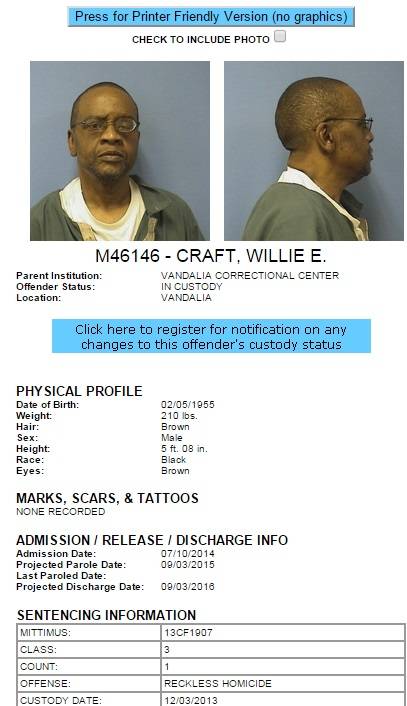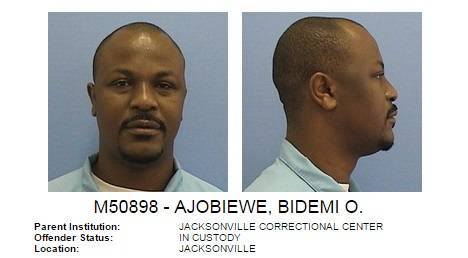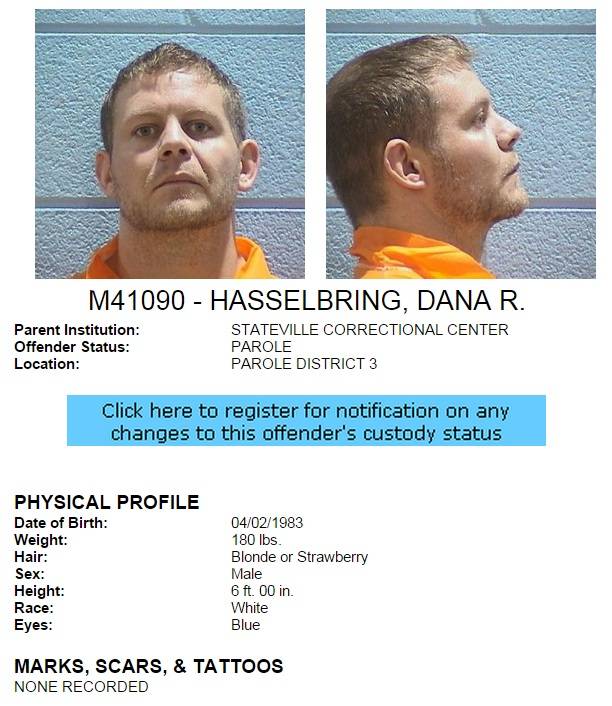You’ve heard about “metabolites” in three sensational Champaign County legal cases, just this year.
When Willie Craft mowed down two pedestrians, killing Mimi Liu, some of you were excited to know that he’d be prosecuted and imprisoned. When the 4th Appellate Court reversed Dana Hasselbring’s aggravated DUI conviction, a lot of you felt justice was served. When Judge Richard Klaus sentenced Bidemi Ajobiewe to six years in prison (and deportation) you were outraged.
Only one of these defendants is serving time under the “metabolites” law. It’s a bad law.
(625 ILCS 5/11-501) (from Ch. 95 1/2, par. 11-501) Sec. 11-501. Driving while under the influence of alcohol, other drug or drugs, intoxicating compound or compounds or any combination thereof.
(a) A person shall not drive or be in actual physical control of any vehicle within this State while:
(1) the alcohol concentration in the person’s blood or breath is 0.08 or more based on the definition of blood and breath units in Section 11-501.2;
(2) under the influence of alcohol;
(3) under the influence of any intoxicating compound or combination of intoxicating compounds to a degree that renders the person incapable of driving safely;
(4) under the influence of any other drug or combination of drugs to a degree that renders the person incapable of safely driving;
(5) under the combined influence of alcohol, other drug or drugs, or intoxicating compound or compounds to a degree that renders the person incapable of safely driving; or
(6) there is any amount of a drug, substance, or compound in the person’s breath, blood, or urine resulting from the unlawful use or consumption of cannabis listed in the Cannabis Control Act, a controlled substance listed in the Illinois Controlled Substances Act, an intoxicating compound listed in the Use of Intoxicating Compounds Act, or methamphetamine as listed in the Methamphetamine Control and Community Protection Act. Subject to all other requirements and provisions under this Section, this paragraph (6) does not apply to the lawful consumption of cannabis by a qualifying patient licensed under the Compassionate Use of Medical Cannabis Pilot Program Act who is in possession of a valid registry card issued under that Act, unless that person is impaired by the use of cannabis.
The final sentence of the law demonstrates just how stupid it is: It’s okay to drive with marijuana metabolites if you have a note from your doctor … just as long as you aren’t stoned.
Bidemi Ajobiewe was not stoned when his truck crossed the median of I-74 on January 18, 2014. Marijuana is not the reason that truck struck Ben Knight’s van, killing Kristy Etchison. Snow and ice were the culprits, as they were in the dozens of accidents that occurred that day.
It happens.

But because Ajobiewe had traces of marijuana by-product in his system, he’s in prison.
Dana Hasselbring is not in prison. Attorney Jim Martinkus convinced a 4th Appellate panel to reverse Judge John Kennedy’s erroneous ruling preventing Martinkus from distinguishing “metabolites” from actual drugs, in a written instruction to the jury. [See People v. Hasselbring, 2014 IL App (4th) 131128]
Martinkus demonstrated that Hasselbring had no illegal drugs in his system, and that convictions under the Illinois DUI law require the presence of illegal drugs (or alcohol).
“Illegal drugs” is limited to substances enumerated in the Illinois Controlled Substances Act. Cocaine is among the drugs enumerated. Post-metabolism by-products of cocaine, specifically Benzoylecgonine, are not enumerated.
Hasselbring is on parole for involuntary manslaughter.

Willie Craft is in prison, but not for “metabolites.” His two year sentence (for reckless homicide) fits the rationale of punishment in historical jurisprudence. i.e. he’s off the streets, which ostensibly makes us safer. And he’s being punished for irresponsible actions which killed an innocent person. Incapacitation + retribution.
Belden Fields and Claudia Lennhoff argued that society is worse served by incarcerating Willie Craft. Their opinions are especially compelling if one accepts the Craft camp’s contention that Willie Sr. had not driven for years. (Does one?)
The state’s position is that society will definitely be safe from Willie Craft Sr. if he’s in prison. But of course, that includes only those of us who weren’t being fed & sheltered by Willie Craft Sr. at the time of his arrest.
Of the traditional purposes for punishment — deterrence, incapacitation, retribution & rehabilitation — two are ideological and one is arguably immoral. Only incapacitation is inarguably efficacious and morally unambiguous. This is where the Illinois “metabolites” law fails utterly: It is thoroughly incapable of preventing inclement weather, the proximate cause of Kristy Etchison’s death.
Bidemi Ajobiewe is incarcerated at the Jacksonville Correctional Center, a minimum security prison 33 miles from the Executive Mansion, where Bruce Rauner should, at this very moment, be signing a complete pardon for Ajobiewe’s release.

The outcome of these three cases seems unjust, in ascending order of injustice. The guy who did the least wrong — and poses the smallest risk to society — got the longest sentence, and will be removed from society once he’s served that sentence.
The one guy who’s not in prison might have learned his lesson. Maybe he won’t ride fast motorcycles anymore. Maybe he’ll wear a helmet in the future.
On the other hand, Hasselbring got a speeding ticket three years and two days after the collision that killed Eddie Piat. You’ll find the Champaign Circuit Clerk lists 32 traffic offenses in his name, dating to 1999. These offenses include reckless driving (twice), improper lane changes, driving without insurance, passing an unloading school bus, driving on a suspended license, eluding a peace officer (twice in the same month) and one “OP MOTOR/PEDALCYCLE ONE WHEEL“ which seems to mean popping a wheelie.
You’ll also find felony and misdemeanor charges for battery, aggravated battery, mob action, criminal damage to property and disorderly conduct.
So if there’s anyone making your streets less safe, it’s arguably the one who’s out and on them.

The general assembly could double-down on stupid, and add Benzoylecgonine to its list of controlled substances. But would that make you safer? Isn’t the goal to keep impaired drivers off the road?
No, as it turns out, the legislature doesn’t care about your safety. Counting his DUI conviction from 2006 (but not the one stricken by the Appellate 4th), Hasselbring still gets three cracks at impaired motoring before the serious consequences kick in.
(D) A fifth violation of this Section or a similar or similar provision is a Class X felony. If at the time of the violation, the alcohol concentration in the defendant’s blood, breath, or urine was 0.16 or more








